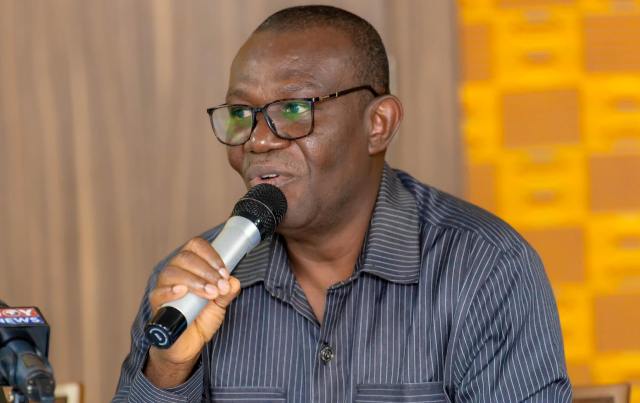The recently enacted Energy Sector (Amendment) Act, 2025, has been championed by the Chairman of the Parliamentary Select Committee on Energy, Hon. Emmanuel Kwasi Bedzrah, as a “necessary and strategic” intervention designed to fortify Ghana’s beleaguered power sector and guarantee a steady supply of electricity across the nation.
Addressing the media in Parliament on Tuesday, the Ho West MP firmly refuted claims by minority MPs alleging that the government had misled Ghanaians regarding the introduction of a new GH¢1 levy on refined petroleum products. He dismissed these assertions as “false, misleading, and politically motivated,” emphasizing that the legislation underwent open deliberation and received majority support after full participation from all sides of Parliament.
“All members from the minority side in the Finance Committee and all the leaders from the Energy Committee were present in the committee meeting when we discussed this Amendment Bill.1 No one walked out. They were all there,” Hon. Bedzrah stated, attributing current agitations from some groups to “deliberate misinformation from the minority.”
Also Read: Crisis at the gates: Slum threatens GLISS, endangering students and academic excellence
Explaining the imperative behind the new Act, Hon. Bedzrah unveiled the grim reality of Ghana’s power sector, which is currently staggering under the weight of a monumental US$3.1 billion in energy sector-related debts as of December 2024. A significant portion of this, exceeding US$1.7 billion, is owed to Independent Power Producers (IPPs). Furthermore, the country faces a daunting monthly deficit of GH¢2 billion in the power sector, a predicament the Chairman attributed to past mismanagement.
“This is the reality, not fiction. These figures are not government estimates, they are verifiable and have been validated by independent bodies,” he stressed, underscoring the severity of the financial strain.
Hon. Bedzrah highlighted Ghana’s heavy reliance on thermal plants, which necessitate an annual expenditure exceeding US$1.2 billion—approximately GH¢12.6 billion—on liquid fuels to sustain power generation. He pointed out that the existing electricity tariff structure falls short of covering these substantial fuel costs, and a drastic 50% tariff increase, while financially expedient, would impose an unbearable burden on Ghanaian households. “That is a burden no Ghanaian household should bear, and we refuse to let that happen,” he affirmed.
The new amendment, which officially took effect last week following Presidential assent, introduces a GH¢1 levy per litre of refined petroleum products. This strategic initiative is projected to generate approximately GH¢5.7 billion annually, crucial funds earmarked specifically for the procurement of liquid fuels.
Crucially, Hon. Bedzrah provided assurances that this new levy will not translate into an increase in fuel prices at the pump. He cited a demonstrable drop in average fuel prices from GH¢16 in January 2025 to a current average of GH¢12.08 per litre as of June 2025 (according to recent market reports). He clarified that even with the GH¢1 levy, fuel remains significantly more affordable than it was earlier in the year. “This is not a deception, but a strategic and responsible way to raise funds without burdening the Ghanaian consumer,” he asserted.
The Energy Committee Chair reiterated the government’s unwavering commitment to transparency and sustainable energy policies.3 “We have not lied. We have not hidden the truth. We are transparent about the challenges and we are bold in implementing solutions that protect both the consumer and the future of our power sector,” Hon. Bedzrah declared.
He concluded with a stern caution against the politicization of vital national issues such as energy, which he described as fundamental to Ghana’s economic development and national security. “Let us not play politics with the power that lights our homes, powers our hospitals and drives our industries,” he urged.
While some civil society groups and transport unions have voiced concerns over the new act, the government maintains that the measure is undeniably in the best interest of Ghana’s long-term national energy security.
By Osumanu Al-Hassan/thenewsbulletin24.com


